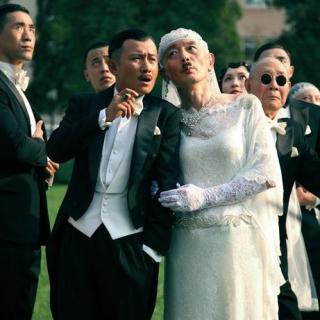
介绍:
更多信息请关注今天的微信:搜索英语环球 NEWSPlus
In 2010, Chinese director Jiang Wen released an action comedy film "Let the Bullets Fly" which rocked the country's movie market. Its huge commercial success made everyone believe Jiang had found the way to dominate Chinese cinemas. In fact, his grip on the audience was so firm that even critics refrained from pricking, or if they did whine their voices must certainly have been drowned in the deafening sound of adulation.
But with the advent of his new film "Gone with the Bullets", the previously muffled discontent of his antagonists have suddenly found an outlet. Starting from real estate veteran Ren Zhiqiang who spoke of his difficulties understanding the movie, more and more self-styled critics blamed their bewilderment on the director's ego. They believe that Jiang Wen has once again lost control in narcissistic self expression and this is going to cost him dearly in audience reception.
One thing about the film that sets the critics on fire is the vast number of messages hidden in the story.
In 1920, a Shanghai playboy Yan Ruisheng robbed and murdered a well-known prostitute, he was later caught and publicly executed. But that was not the whole story, before the case was closed, local media had explored and exposed almost every detail of the suspect and his victim. And after Yan's death, his crime was told in China's first full-length movie and once again became a product for public entertainment. "Gone with the Bullets" examines the relative truths in news reporting and filmmaking, his idea is best represented by a scene where his character vandalises a camera in a film set.
This is just one example of Jiang's many implicit ideas. During 140 minutes of sitting, we also witness new money's attempts to become respectably "old", a politically married couple's advices to their daughter regarding the importance of concubines and the wisdom about men, plus a lot more metaphors and mockeries. All of these can be too much to digest, it certainly took me a second viewing to get an overview.
And comprehension is not made easier by the varied forms of expression.
Beginning with an extravagant beauty show featuring garish colours, loud music and way too many bared legs, the movie's narrative is continued in talk show, black and white silent film and stage play, all the while paying tribute to "The Godfather", "A Trip to the Moon", "2001: A Space Odyssey" and many others.
This wealth of information and sometimes contradicting opinions drive the critics over the edge. Some of them refer to Jiang Wen's good upbringing and his other autheur films as evidence to suggest he is an elitist director and has no respect for the needs of the viewers.
I think these critics' worries are not well grounded.
First of all, one doesn't have to be an elite to be able to enjoy classic music and well-made films, and the reluctance to exercise one's brain should not be encouraged as normality. China's movie industry has already seen too much vulgarity made in the name of satisfying the audience. It is high time we stopped feeding the viewers with nonsensical comedies, it is the ultimate crime of disrespect a director can commit against his viewers.
Jiang Wen, on the other hand, have consistently encouraged his fans to think with his challenging storylines, and the images and music in his films are always enjoyable. Any viewer in their right mind who refuses to wallow in the mud of vulgarity will be able to appreciate the healthy amount of his narcissism. The only question is, who would you rather be?
大家还在听

